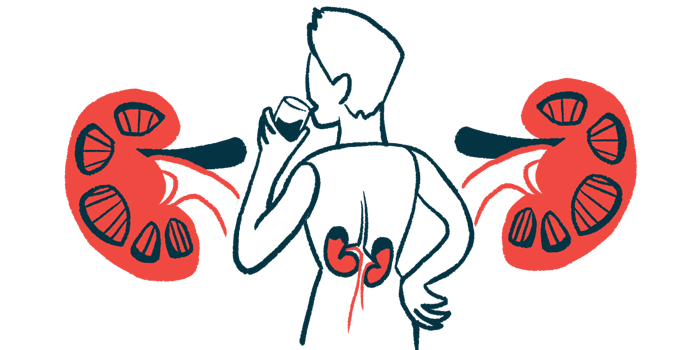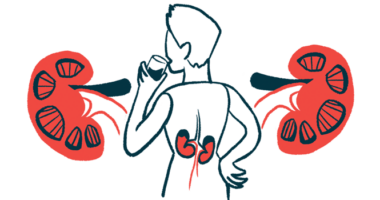Severe C. difficile Infection in Colon Triggers aHUS in Young Woman

Severe colon infection caused by the bacteria Clostridioides difficile triggered a rare case of atypical hemolytic uremic syndrome (aHUS) in a healthy young woman, a case study reported.
She responded quickly to treatment with Soliris (eculizumab), its scientists noted, leading them to suggest this bacterial infection can be a cause of primary aHUS.
The case study, “Clostridioides difficile-Associated Atypical Hemolytic-Uremic Syndrome Successfully Treated With Eculizumab: A Case Report and Literature Review,” was published in the journal Critical Care Explorations.
Infections, particularly in the lungs and digestive tract, are a common cause of aHUS, leading to uncontrolled activation of the complement system, a part of the immune system that targets and clears invading microbes. Abnormal complement activation causes inflammation and blood clotting in small blood vessels, particularly those in the kidneys.
In rare cases, aHUS can be triggered by the bacteria Clostridioides difficile — a common soil microbe known to cause diarrhea and colon inflammation (colitis), mostly in older hospitalized adults after the use of antibiotics.
“We present a case of a previously healthy 21-year-old woman who developed fulminant C. difficile colitis and atypical hemolytic-uremic syndrome,” the researchers at the Brooke Army Medical Center, Fort Sam Houston in Texas, wrote.
The woman arrived at the hospital after four days of abdominal pain, painful urination, and multiple episodes of bloody diarrhea accompanied by nausea and vomiting.
She was not taking any medications, including antibiotics, and did not have a family history of inflammatory bowel disease. Her vital signs were typical, and an examination only showed signs of abdominal tenderness.
Although her hemoglobin levels, kidney function, platelet count, and urinalysis were normal, she had an elevated white blood cell count, a sign of infection. Of note, hemoglobin is the protein in red blood cells that is responsible for transporting oxygen.
Stool analysis was positive for the toxin B gene from C. difficile, but negative for other microbes. Based on this finding and abdominal CT scans, the woman was diagnosed with severe C. difficile colitis and started on anti-microbial medications.
Despite two days of treatment, her abdominal pain increased and urination levels dropped under normal values. Blood tests continued to show elevated white blood cell numbers, as well as high levels of creatinine, a marker of kidney dysfunction, declining platelet count and hemoglobin levels, and markedly high d-dimer levels, a sign of blood clotting.
To prevent organ failure due to rapid-onset C. difficile colitis, she underwent a total abdominal colectomy, a surgical procedure to remove the large intestine.
Postoperative lab tests continued to show elevated creatinine levels, low hemoglobin levels, and significant acidosis, or too much acid in body fluids. Due to acute kidney injury, she was started on renal replacement therapy — a treatment that replaces the normal blood-filtering function of the kidneys.
After six days in the hospital, she developed severe agitation and visual hallucinations with a high fever and seizures, requiring intubation to protect her breathing. Electroencephalography (EEG) showed unusual brain activity, and MRI brain scans suggested she had developed encephalitis, or brain tissue inflammation.
Further blood tests found signs of red blood cell damage, a hallmark of aHUS, including low haptoglobin and hemoglobin levels, the presence of red blood cell fragments (schistocytes), elevated lactate dehydrogenase levels, and low platelet numbers. Low levels of C3 and C4, two complement system-related proteins, also suggested aHUS.
The woman was too ill to undergo a kidney biopsy to confirm an aHUS diagnosis. Instead, working under the assumption of aHUS caused by C. difficile colitis, doctors started her on Soliris, an approved treatment designed to halt complement activation. She was also given low doses of a pain killer and antipsychotic medication, as well as high-dose anti-inflammatory steroids for her encephalitis.
Over the next three days, her kidney function and neurological status improved rapidly, with MRI scans showing a resolution of brain abnormalities.
The woman continued treatment with Soliris at a weekly dose of 900 mg for four weeks, then moved to a 1,200 mg biweekly dose.
She was discharged with full kidney function. Over the next two months, her kidney, blood, and neurological tests all registered as normal. She completed two months of Soliris treatment, and remained in remission at this study’s end, four months after being discharged.
Examination of extracted colon tissue did not show signs of inflammatory bowel disease, but rather of blood clotting in small blood vessels along with inflammatory colitis. DNA analysis of aHUS-related genes failed to detect abnormalities.
“We propose that C. difficile-associated atypical hemolytic-uremic syndrome be defined as primary atypical hemolytic-uremic syndrome and strongly consider [Soliris] as first-line therapy,” the scientists wrote. Secondary aHUS, a disease subtype, can develop due to another disorder, or the use of certain medications, without complement activation.
“This case highlights that the high morbidity and mortality associated with aHUS is likely also present with [C. difficile-associated aHUS] and that timely recognition and initiation of appropriate therapy are integral to improving outcomes,” they concluded.







